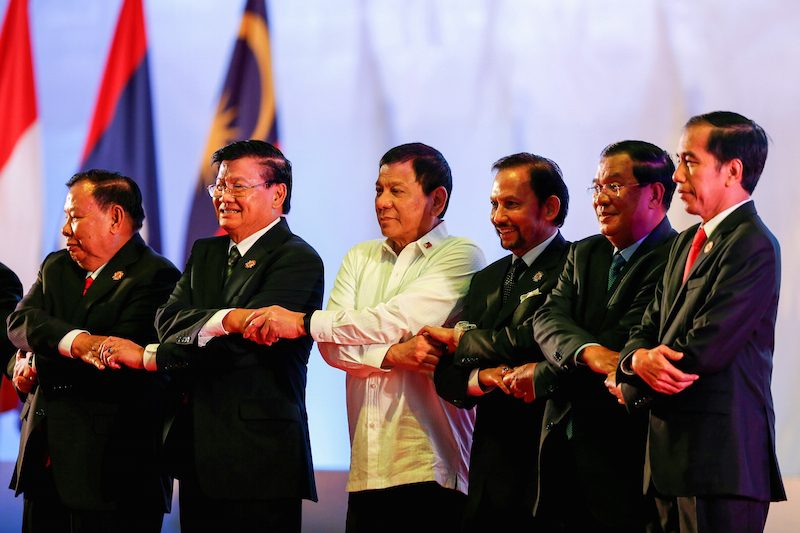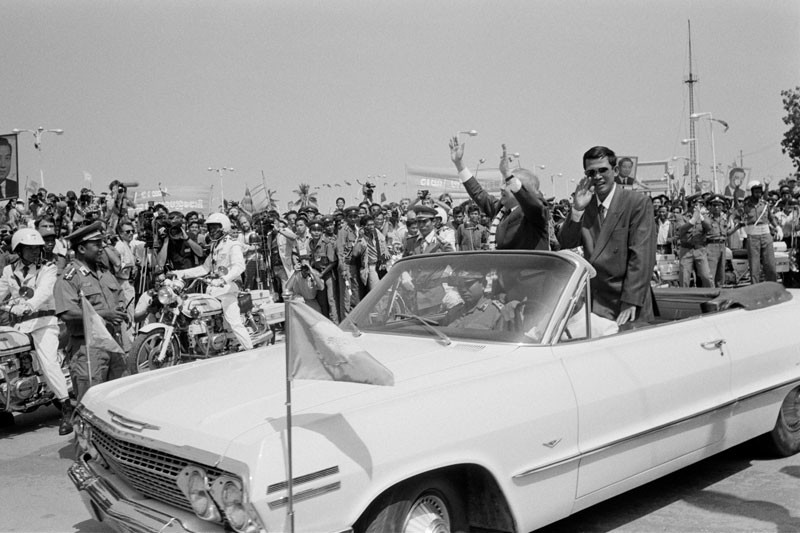As Asean leaders gather in Laos this week, reports suggest Cambodia may be spared its now customary role as Beijing’s South China Sea spoiler.
But even if the topic is sidelined at this year’s Asean Summit in Vientiane, Prime Minister Hun Sen will continue to face accusations that Cambodia’s loyalty to China has been purchased—charges that analysts warn threaten unity within the regional bloc as some members continue to compete with Beijing over rival claims to swaths of the sea.

Meeting ahead of the three-day summit, which began on Tuesday, Philippine President Rodrigo Duterte told Singaporean Prime Minister Lee Hsien Loong that he would not ask members to rally around a U.N.-backed tribunal verdict that invalidated China’s maritime claims on the back of a complaint made by Manila, government spokesman Phay Siphan said on Tuesday.
Mr. Duterte “said he’s not going to raise the South China Sea verdict at this meeting,” Mr. Siphan said, citing conversations with Cambodian diplomats in Laos.
Reuters reported on Monday that a draft version of a joint statement to be released at the summit mentions the sea, but not The Hague’s July ruling in favor of the Philippines.
Analysts have suggested that Cambodia is doing the bidding of Beijing by repeatedly blocking past joint statements cheering the verdict.
Mr. Hun Sen’s decision to align with China has “fractured Asean’s thin veneer of solidarity on the South China Sea,” said Lee Jones, an associate professor of politics and international relations at Queen Mary University of London.
Although Mr. Jones contends that Cambodia’s “ruling regime has left the Cold War behind entirely in its quest for power and self-enrichment,” his research into the history of Asean suggests that the organisation has not always acted in the best interests of Mr. Hun Sen or Cambodia.
Founded in 1967 by Indonesia, Singapore, Thailand, Malaysia and the Philippines, the group, nominally bound by a policy of non-interference in each other’s affairs, actually staked common ground against Chinese-funded communist insurgents in their own countries, according to Mr. Jones.
“ASEAN was developed to buy time for its elites to impose conservative, capitalist order on their highly disparate polities” amid waning Western influence in the region, he wrote in a 2007 paper on the topic.
That position effectively meant that “Asean elites were actually deeply implicated in U.S. intervention in Indochina” by sending arms and aid to anti-communist governments, including Lon Nol’s Khmer Republic.
U.S. intervention came at a steep cost for Cambodia. American bombs killed tens of thousands of people and galvanized support for the Khmer Rouge, which rose to power in 1975.
Vietnam routed Khmer Rouge forces in 1979 and installed a government led by Mr. Hun Sen and other defectors.
Thailand, fearful of the Vietnamese at its doorstep, “corralled Asean into opposing Vietnam’s invasion,” according to Mr. Jones.
Thailand, now cooperating with Beijing, helped rebuild Khmer Rouge forces from 2,000 stragglers to a 40,000-person force and funneled hundreds of millions of dollars to the group.
“ASEAN diplomacy, threats and promises of aid were instrumental in corralling the Khmer Rouge and non-communist resistance groups together into the so-called Coalition Government of Democratic Kampuchea (CGDK) in 1982,” Mr. Jones writes, with the goal of displacing Mr. Hun Sen’s government through a political settlement.
Asean’s Cold War interventions in Cambodia “had the effect of isolating the country…from foreign aid and prolonging destabilising and debilitating armed conflict,” Mr. Jones concludes.
Asean was eager to have Cambodia join its ranks after it helped coordinate the departure of Vietnamese forces from Cambodia in 1989, which made way for the 1991 Paris Peace Agreements and 1993 national election, according to a 1998 paper by Sorpong Peou, now a politics professor at Ryerson University in Toronto.
The bloc was given pause as the political feud between Mr. Hun Sen and his co-prime minister, Prince Norodom Ranariddh, escalated into factional fighting in 1997, and was won by Mr. Hun Sen.
When a group of three Asean diplomats met with Mr. Hun Sen in 1998 to help resolve the dispute, the prime minister demanded that Asean either “admit ‘his’ country by July 23 or ‘forget it for the next 5 or 20 years,’” according to Mr. Peou.

Asean admitted Cambodia after the country’s 1998 national election under the theory that “flawed elections were better than none at all” and faith that Mr. Hun Sen could bring stability to the nation, he writes.
Once Cambodia was admitted, “the past was laid to rest,” Mr. Jones said on Tuesday. “I am actually surprised by how much all the Indochinese states have moved on, given how viciously their non-communist Asean neighbors behaved toward them.”
“What matters to Hun Sen now is what can help him and the Cambodian People’s Party stay in power and fill their boots,” he added.
Mr. Hun Sen’s positions have still led to occasional clashes with Asean over the years. During a 2011 summit in Jakarta, the prime minister broke protocol and the listed agenda to voice frustrations with Thailand over a border dispute centered around Preah Vihear Temple, which The Hague ruled to be a part of Cambodia in 1962.
Carl Thayer, an emeritus professor at the Australian Defense Force Academy in Canberra, said that there was irony in Cambodia defending the 1962 verdict, given that it is now refusing to accept the decision against Beijing.
“Somehow these judges are acceptable, but all the judges on behalf of the Philippines are corrupt,” he said on Tuesday.
“I can see him being unsatisfied that the world didn’t come to his aid” in the Preah Vihear case, Mr. Thayer said, adding that Mr. Hun Sen’s allies in China also appeared to have little appetite for backing Cambodia when their interests were not at stake.
“Let’s ask the real question,” he said of international disputes not involving Beijing. “What would China do?”




